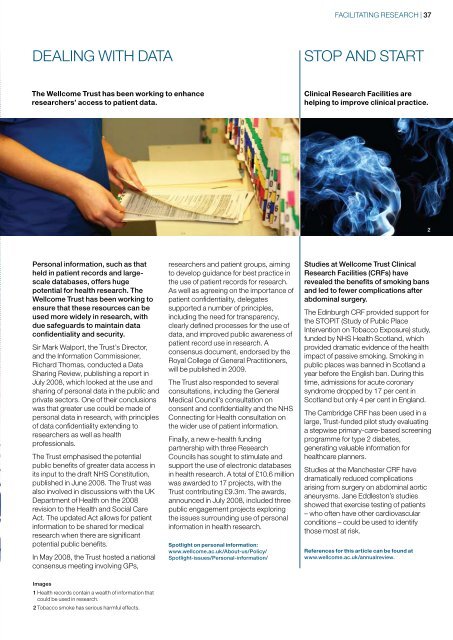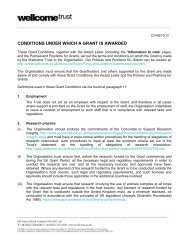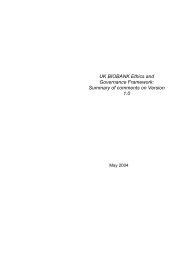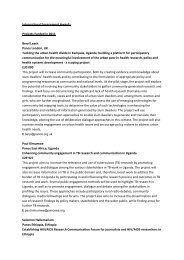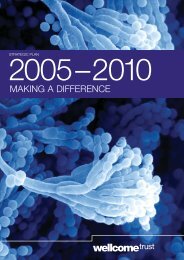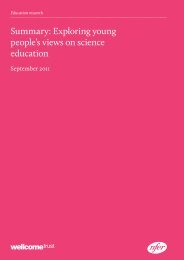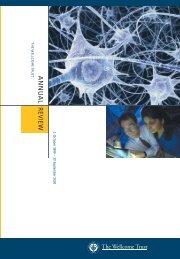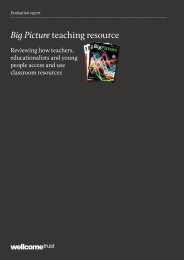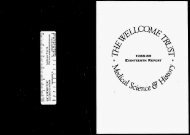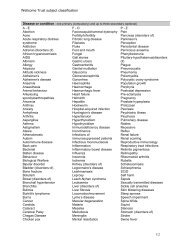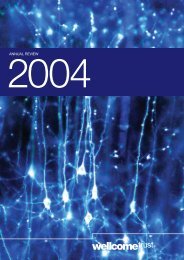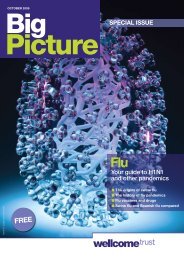Create successful ePaper yourself
Turn your PDF publications into a flip-book with our unique Google optimized e-Paper software.
FACILITATING RESEARCH | 37<br />
Dealing with data<br />
Stop and start<br />
The <strong>Wellcome</strong> <strong>Trust</strong> has been working to enhance<br />
researchers’ access to patient data.<br />
Clinical Research Facilities are<br />
helping to improve clinical practice.<br />
1 2<br />
Personal information, such as that<br />
held in patient records and largescale<br />
databases, offers huge<br />
potential for health research. The<br />
<strong>Wellcome</strong> <strong>Trust</strong> has been working to<br />
ensure that these resources can be<br />
used more widely in research, with<br />
due safeguards to maintain data<br />
confidentiality and security.<br />
Sir Mark Walport, the <strong>Trust</strong>’s Director,<br />
and the Information Commissioner,<br />
Richard Thomas, conducted a Data<br />
Sharing Review, publishing a report in<br />
July 2008, which looked at the use and<br />
sharing of personal data in the public and<br />
private sectors. One of their conclusions<br />
was that greater use could be made of<br />
personal data in research, with principles<br />
of data confidentiality extending to<br />
researchers as well as health<br />
professionals.<br />
The <strong>Trust</strong> emphasised the potential<br />
public benefits of greater data access in<br />
its input to the draft NHS Constitution,<br />
published in June 2008. The <strong>Trust</strong> was<br />
also involved in discussions with the UK<br />
Department of Health on the 2008<br />
revision to the Health and Social Care<br />
Act. The updated Act allows for patient<br />
information to be shared for medical<br />
research when there are significant<br />
potential public benefits.<br />
In May 2008, the <strong>Trust</strong> hosted a national<br />
consensus meeting involving GPs,<br />
researchers and patient groups, aiming<br />
to develop guidance for best practice in<br />
the use of patient records for research.<br />
As well as agreeing on the importance of<br />
patient confidentiality, delegates<br />
supported a number of principles,<br />
including the need for transparency,<br />
clearly defined processes for the use of<br />
data, and improved public awareness of<br />
patient record use in research. A<br />
consensus document, endorsed by the<br />
Royal College of General Practitioners,<br />
will be published in 2009.<br />
The <strong>Trust</strong> also responded to several<br />
consultations, including the General<br />
Medical Council’s consultation on<br />
consent and confidentiality and the NHS<br />
Connecting for Health consultation on<br />
the wider use of patient information.<br />
Finally, a new e-health funding<br />
partnership with three Research<br />
Councils has sought to stimulate and<br />
support the use of electronic databases<br />
in health research. A total of £10.6 million<br />
was awarded to 17 projects, with the<br />
<strong>Trust</strong> contributing £9.3m. The awards,<br />
announced in July 2008, included three<br />
public engagement projects exploring<br />
the issues surrounding use of personal<br />
information in health research.<br />
Spotlight on personal information:<br />
www.wellcome.ac.uk/About-us/Policy/<br />
Spotlight-issues/Personal-information/<br />
Studies at <strong>Wellcome</strong> <strong>Trust</strong> Clinical<br />
Research Facilities (CRFs) have<br />
revealed the benefits of smoking bans<br />
and led to fewer complications after<br />
abdominal surgery.<br />
The Edinburgh CRF provided support for<br />
the STOPIT (Study of Public Place<br />
Intervention on Tobacco Exposure) study,<br />
funded by NHS Health Scotland, which<br />
provided dramatic evidence of the health<br />
impact of passive smoking. Smoking in<br />
public places was banned in Scotland a<br />
year before the English ban. During this<br />
time, admissions for acute coronary<br />
syndrome dropped by 17 per cent in<br />
Scotland but only 4 per cent in England.<br />
The Cambridge CRF has been used in a<br />
large, <strong>Trust</strong>-funded pilot study evaluating<br />
a stepwise primary-care-based screening<br />
programme for type 2 diabetes,<br />
generating valuable information for<br />
healthcare planners.<br />
Studies at the Manchester CRF have<br />
dramatically reduced complications<br />
arising from surgery on abdominal aortic<br />
aneurysms. Jane Eddleston’s studies<br />
showed that exercise testing of patients<br />
– who often have other cardiovascular<br />
conditions – could be used to identify<br />
those most at risk.<br />
References for this article can be found at<br />
www.wellcome.ac.uk/annualreview.<br />
Images<br />
1 Health records contain a wealth of information that<br />
could be used in research.<br />
2 Tobacco smoke has serious harmful effects.


